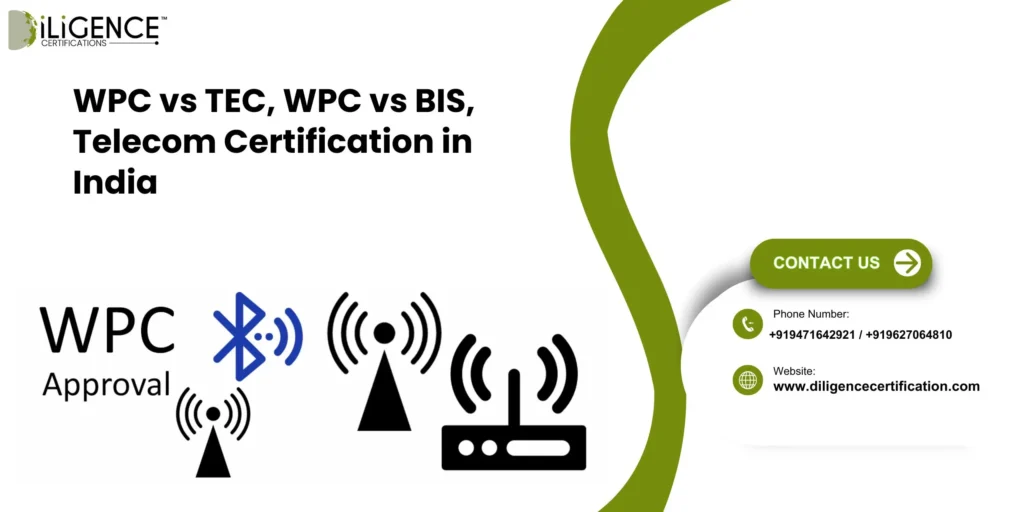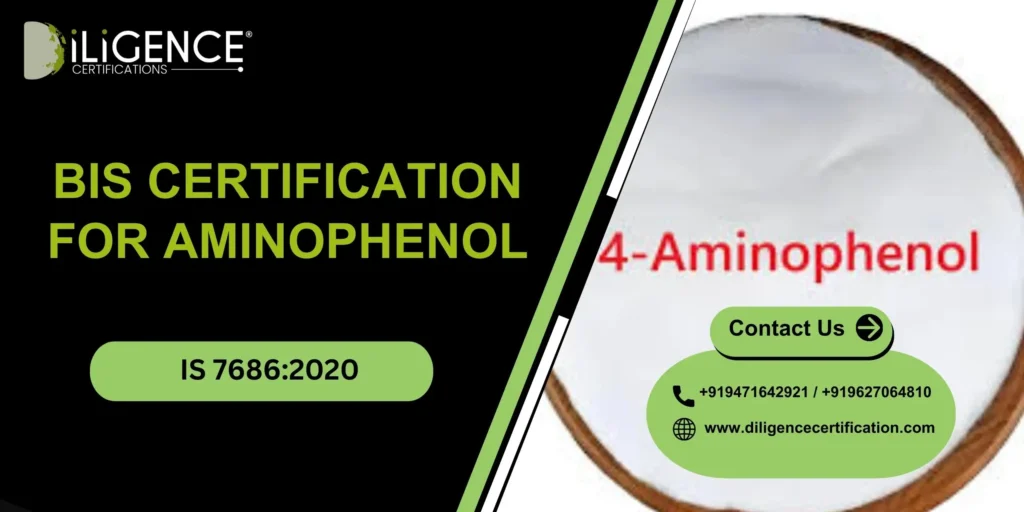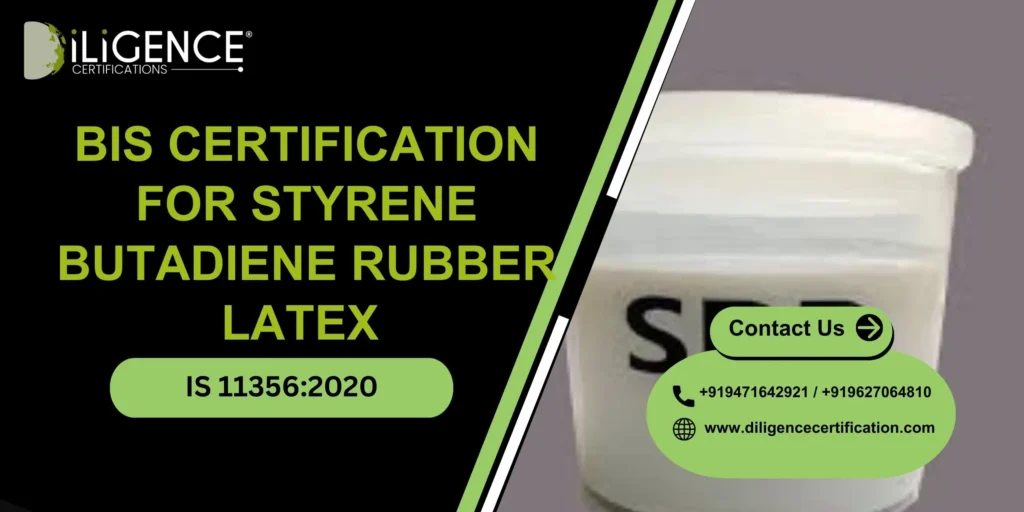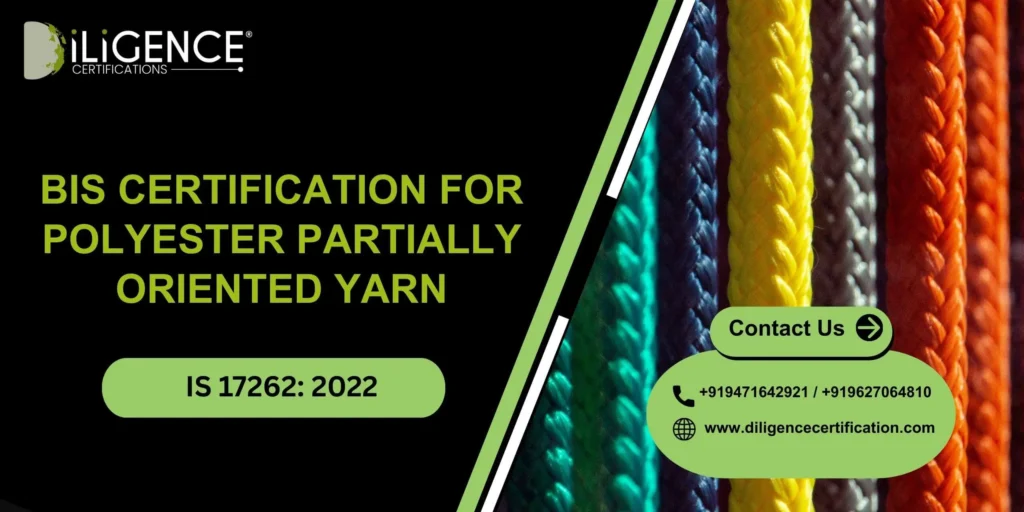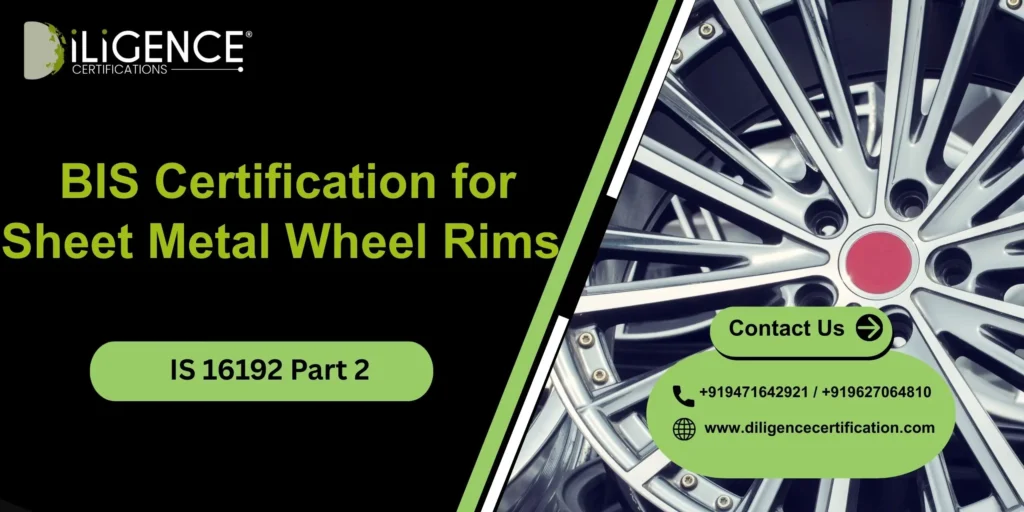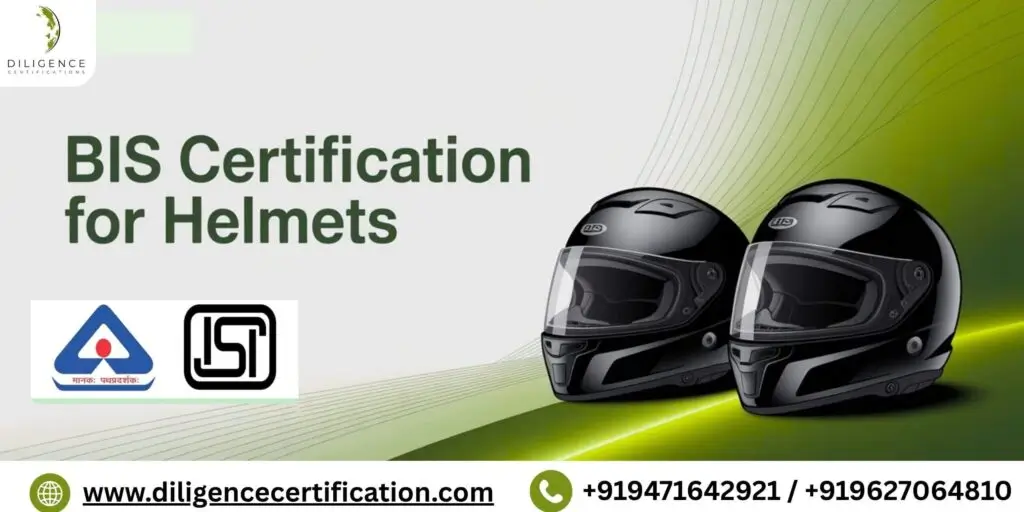- WPC ensures RF and wireless devices comply with Indian spectrum regulations.
- TEC certifies telecom equipment under MTCTE for network safety and interoperability.
- BIS covers electronic product safety under the Compulsory Registration Scheme.
- WPC vs TEC differs mainly in wireless compliance vs telecom network compliance.
- Telecom Certification India involves meeting WPC, TEC, and BIS requirements depending on product type.
Introduction

The telecom and electronics market in India is a complex system of regulations that requires manufacturers and importers to achieve a certain level of certification standards before introducing their products. Each regulatory body operates in a different area – wireless equipment, telecom network devices, and electronic product safety – hence it is very important to understand what certifications your product requires. This guide clarifies the differences between WPC, TEC, and BIS and provides an overview of Telecom Certification India to the users, so that they can be sure of their compliance when dealing with the regulatory authorities. Wireless Planning and Coordination
Understanding Telecom Certification in India
Telecom certification in India is the process through which devices that are wireless, part of a telecom network, or electronic need to conform to the safety, technical, and regulatory standards set by the country to be allowed for sale or import. Various agencies are responsible for different facets of the conformity, hence it is very important to figure out the right certification for your product from the very beginning.
Key Points:
• Ensures product safety, performance, and legal compliance in India.
• WPC regulates RF and wireless devices operating on specific frequencies.
• TEC certifies telecom network equipment under MTCTE.
• BIS covers electronic product safety under the CRS scheme.
• Correct certification avoids import delays and market restrictions.
What is WPC Certification?
WPC Certification—primarily the Equipment Type Approval (ETA)—is mandatory for any device that uses de-licensed radio frequencies such as Wi-Fi, Bluetooth, RFID, Zigbee, or other RF technologies. Without WPC ETA, importing or selling such wireless products in India is not allowed.
Key Points:
• Required for any device using Wi-Fi, Bluetooth, RF, or other wireless communication.
• Ensures the device operates within India’s approved frequency and power limits.
• Based on RF test reports from accredited labs (foreign reports accepted if format compliant).
• Essential before importing or manufacturing wireless products in India.
• Covers modules, integrated wireless chips, and finished wireless-enabled products.
What is TEC Certification?
TEC Certification is a permission given to a product under MTCTE (Mandatory Testing and Certification of Telecom Equipment) which is a framework. It is a measure which relates to devices connecting to telecom networks such as routers, switches, OLT/ONT, IoT gateways, base stations, and other communication equipment. In order to prove compliance with the essential requirements laid down by TEC, the products have to go through laboratory testing which should be conducted in India.
Key Points:
• Mandatory for telecom network equipment under MTCTE.
• Ensures product safety, network protection, and performance standards.
• Testing must be done in TEC-designated Indian labs.
• Applies to routers, switches, IoT gateways, telecom interfaces, and similar products.
• Certification is required before importing or selling telecom equipment in India.
What is BIS Certification?
BIS Certification, in simple terms, is a symbol that portrays a product as a user-safe one and that it meets the quality standards set by India. For instance, in the case of electronic devices such as mobiles, batteries, LED lights, power banks, laptops, CCTVs, and a plethora of other electronic gadgets, the Indian market can only be open to such a device if it has been tested in a lab that is recognized by BIS and registration is mandatory.
Key Points:
• Ensures product safety, reliability, and quality for consumers.
• Mandatory for numerous electronic products under the CRS list.
• Requires in-country testing at BIS-approved laboratories.
• Needed before importing, manufacturing, or selling regulated electronics.
• Covers both components (like batteries) and finished electronic devices.
WPC vs TEC: Key Differences
| WPC | TEC |
| Covers wireless and RF-based devices | Covers telecom network equipment |
| Issues ETA for frequency compliance | Issues MTCTE for network compliance |
| Accepts foreign RF test reports | Requires testing in Indian labs |
| Applies to Wi-Fi, Bluetooth, RFID devices | Applies to routers, switches, OLT/ONT |
| Ensures legal spectrum usage | Ensures safety and interoperability |
WPC vs BIS: Key Differences
| WPC | BIS |
| Regulates wireless and RF devices | Regulates electronic product safety |
| Issues ETA for frequency compliance | Issues CRS certification for safety standards |
| Focuses on spectrum use and RF performance | Focuses on consumer safety and product quality |
| Accepts foreign RF test reports | Requires testing in BIS-approved Indian labs |
| Needed for Wi-Fi, Bluetooth, RF modules | Needed for mobiles, batteries, LEDs, laptops, etc. |
Common Challenges & How to Avoid Compliance Delays
• Incorrect product classification: Clarify early on if the device is to get WPC, TEC, BIS, or multiple certifications.
• Getting test reports that are incomplete or have missing parts: Make sure that the RF reports, safety reports, and technical documents are in the required formats.
• Selecting non-recited labs: To stay away from re-testing, always employ BIS-approved labs and TEC-designated labs.
• Delay in making the sample ready: Have product samples that meet the standards and the shipping documents ready beforehand.
• Documentation errors: Verify again the model numbers, technical specs, and applicant details so that you will not be rejected.
Why Choose Diligence Certifications
• We offer knowledgeable advice regarding WPC, TEC, and BIS requirements so that the products can be classified correctly.
• The company supports you fully from the very beginning to the end, i.e. they help you with your documents, coordinate the testing, and submit your application.
• With the extensive experience of Diligence in the fields of RF, telecom, and electronics compliance, the approvals can be obtained in a shorter period of time
• By working directly with the authorized labs you can avoid the inconvenience of re-testing and the loss of time that is associated with it.
• The company follows a customer-friendly approach, makes timely updates and offers consultancy that can be relied on to ensure that the certification process is without any
Conclusion
Aware of the distinctions between WPC, TEC, and BIS is a must if you want your wireless, telecom, and electronic products to comply with the mandatory standards in India. Basically, each certification corresponds to a different aspect of product safety, efficient use of the spectrum, and safety of the network. Locating the right requirements at the very beginning, companies will be able to keep away from expensive delay situations and have a trouble-free entry into the Indian market. Working with Diligence Certifications is like having a walking stick during the whole walking trip—expert guidance, accurate documentation, and speedy approvals are some of the benefits that help you to maintain compliance and make a confident launch.
Frequently Ask Questions
What makes WPC, TEC, and BIS certification different from one another in India?
WPC mainly oversees wireless/RF devices; TEC through MTCTE certifies telecom network equipment, and BIS under the Compulsory Registration Scheme ensures the safety of the electronic products.
What kind of products need to be certified by WPC?
Clarifying communication devices, the whole range of products using Wi-Fi, Bluetooth, Zigbee, RFID, or RF modules that are set to work in de-licensed frequencies is in need of WPC ETA prior to import as well as the sale of such products.
Which products are the subject of TEC certification?
Routers, switches, OLT/ONT, IoT gateways, SIP phones, base stations, and other telecom network devices that connect and make a network in Indian telecom.
What kinds of products require BIS certification?
Electronic products, e.g., mobiles, batteries, LED lights, power banks, laptops, CCTVs, adapters, and numerous others that are mentioned under the schedule of the BIS CRS.
Can a single product be required to have WPC, TEC, and BIS certifications together?
Yup. Just take a Wi-Fi-enabled router as an example which might require WPC (wireless), TEC (telecom equipment), and BIS (electronic safety) certifications depending on the operations it performs.
Does WPC allow foreign test reports?
WPC is quite open to foreign RF test reports as long as they are in line with the set formats and frequency parameters.
Does TEC acknowledge foreign lab reports?
TEC does not recognize such reports, as it mandates that testing must be conducted in India at the specified labs under the MTCTE framework.
Is it necessary that BIS testing be conducted in India?
Definitely. BIS testing is limited to only those labs in India which are recognized by BIS; hence, foreign safety reports cannot be considered.
What are the main reasons behind certification delays in the telecom sector?
Some of the most frequent reasons that lead to telecom certification delays are product misclassification, lack of technical documents, test reports not meeting requirements, choosing the wrong lab, and incomplete samples.
Why it is so crucial to properly classify the product?
This is mainly due to the fact that correct classification serves as a kind of a gatekeeper determining the type of certification that the product must undergo (WPC/TEC/BIS). Incorrect classification may result in the delay of imports, re-testing, and being rejected at the application stage and, consequently, monetary losses involuntarily.

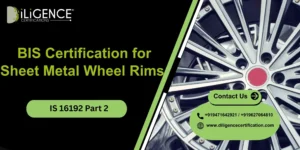

 BIS Certification
BIS Certification
 CDSCO
CDSCO
 CPCB
CPCB
 LMPC
LMPC
 WPC Approval
WPC Approval
 Global Approvals
Global Approvals
 TEC
TEC
 ARAI
ARAI
 BEE
BEE
 ISO Certification
ISO Certification
 Drone Registration
Drone Registration
 NOC For Steel
NOC For Steel



















 Business Registration
Business Registration














 Legal Services
Legal Services
 Trademark Registration
Trademark Registration
 Copyright Registration
Copyright Registration
 Patent Registration
Patent Registration
